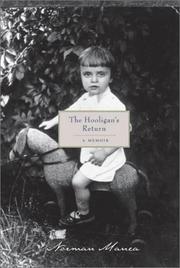| Listing 1 - 10 of 13 | << page >> |
Sort by
|
Book
ISBN: 1280571160 9786613600769 0300184875 9780300184877 9780300179958 0300179952 Year: 2012 Publisher: New Haven, Conn. London Yale University Press
Abstract | Keywords | Export | Availability | Bookmark
 Loading...
Loading...Choose an application
- Reference Manager
- EndNote
- RefWorks (Direct export to RefWorks)
Deported to a concentration camp from 1941 until the end of the war, Norman Manea again left his native Romania in 1986 to escape the Ceausescu regime. He now lives in New York. In this selection of essays, he explores the language and psyche of the exiled writer. Among pieces on the cultural-political landscape of Eastern Europe and on the North America of today, there are astute critiques of fellow Romanian and American writers. Manea answers essential questions on censorship and on linguistic roots. He unravels the relationship of the mother tongue to the difficulties of translation. Above all, he describes what homelessness means for the writer. These essays-many translated here for the first time-are passionate, lucid, and enriching, conveying a profound perspective on our troubled society.
Exiles. --- Immigrants --- Emigrants --- Foreign-born population --- Foreign population --- Foreigners --- Migrants --- Persons --- Aliens --- Deportees --- Refugees --- Language. --- Manea, Norman.
Book
ISBN: 9780802114150 0802114156 Year: 1992 Publisher: New York : Grove Weidenfeld,
Abstract | Keywords | Export | Availability | Bookmark
 Loading...
Loading...Choose an application
- Reference Manager
- EndNote
- RefWorks (Direct export to RefWorks)
Literature and society --- Socialism and literature --- Authorship. --- Censorship --- Littérature et société --- Socialisme et littérature --- Art d'écrire --- Censure --- Manea, Norman. --- Romania --- Roumanie --- Politics and government --- Politique et gouvernement
Book
ISBN: 9782021021981 Year: 2013 Publisher: Paris : Seuil,
Abstract | Keywords | Export | Availability | Bookmark
 Loading...
Loading...Choose an application
- Reference Manager
- EndNote
- RefWorks (Direct export to RefWorks)
Book
ISBN: 9782020962377 Year: 2007 Publisher: Paris : Seuil,
Abstract | Keywords | Export | Availability | Bookmark
 Loading...
Loading...Choose an application
- Reference Manager
- EndNote
- RefWorks (Direct export to RefWorks)
Book
Year: 1979 Publisher: Bucuresti Cartea Romaneasca
Abstract | Keywords | Export | Availability | Bookmark
 Loading...
Loading...Choose an application
- Reference Manager
- EndNote
- RefWorks (Direct export to RefWorks)

ISBN: 0374282560 9780374282561 Year: 2003 Publisher: New York : Farrar, Straus and Giroux,
Abstract | Keywords | Export | Availability | Bookmark
 Loading...
Loading...Choose an application
- Reference Manager
- EndNote
- RefWorks (Direct export to RefWorks)
The Hooligan's Return is a haunting memoir, vividly re-creating Norman Manea's harrowing childhood in Fascist Romania while providing indelible portraits of Ceausescu's dictatorship and the pre- and post-Communist eras. Manea's observations about his visit in 1997 are intertwined with his reflections on his return to Romania after four years in Transnistria, in the camps to which large numbers of Romanian Jews were transported in 1941. As the narrative utilizes one journey to illuminate the other, Manea's friends and family tell their own stories, and the topic of departure and return proves to be an obsessive constant. As the story of a writer who is anything but militant, a literary man more interested in moral and aesthetic questions than in politics, this compelling and beautifully executed memoir explores questions of identity, exile, and the conflict between life and literature, dream and reality, past and present.
Concentration camps --- Novelists, Romanian --- Romanian Americans --- Manea, Norman --- Manea, Norman --- Childhood and youth. --- Travel --- Romania --- Description and travel.
Book
ISBN: 0300182945 0300188625 1280571306 9786613600905 Year: 1995 Publisher: Yale University Press
Abstract | Keywords | Export | Availability | Bookmark
 Loading...
Loading...Choose an application
- Reference Manager
- EndNote
- RefWorks (Direct export to RefWorks)
Book
ISBN: 9686229442 Year: 1991 Publisher: México, D.F. Vuelta
Abstract | Keywords | Export | Availability | Bookmark
 Loading...
Loading...Choose an application
- Reference Manager
- EndNote
- RefWorks (Direct export to RefWorks)
Book
ISBN: 1280571470 9786613601070 0300183461 9780300183467 9780300179941 0300179944 9781280571473 Year: 2012 Publisher: New Haven, CT Yale University Press
Abstract | Keywords | Export | Availability | Bookmark
 Loading...
Loading...Choose an application
- Reference Manager
- EndNote
- RefWorks (Direct export to RefWorks)
Norman Manea, Romania's most famous contemporary author, twice has survived the grip of totalitarian regimes. No stranger to exile, he mines its complexities and disorientations in this extraordinarily compelling novel, The Lair. Exile in the motherland and away from it is the shared plight of his protagonists. Nowhere at home, they move through their lives in a continuous, ever-elusive quest for national and individual identity. Manea's characters seek a place and a voice in America, only to discover that the shackles of their native totalitarian and nationalist ideologies are impossible to break.Manea's themes and narrative approach are intricate: his style fluctuates in correspondence with the instability of his characters' lives, his story is encased within an elaborate network of allusions and paradoxes. Yet in the midst of the novel's overriding disorientation, the author establishes intersections and uncovers the universal. Through the predicaments of his perpetual outsiders, he offers a poignant assessment of the conflicts of the individual in the age of globalization. He writes with unmatched intensity and a unique sensitivity to the human tragicomedy.
Romanian fiction. --- Romanian literature. --- Balkan literature --- Romanian literature
Book
ISBN: 9782020832960 2020832968 Year: 2006 Publisher: Paris: Seuil,
Abstract | Keywords | Export | Availability | Bookmark
 Loading...
Loading...Choose an application
- Reference Manager
- EndNote
- RefWorks (Direct export to RefWorks)
| Listing 1 - 10 of 13 | << page >> |
Sort by
|

 Search
Search Feedback
Feedback About UniCat
About UniCat  Help
Help News
News